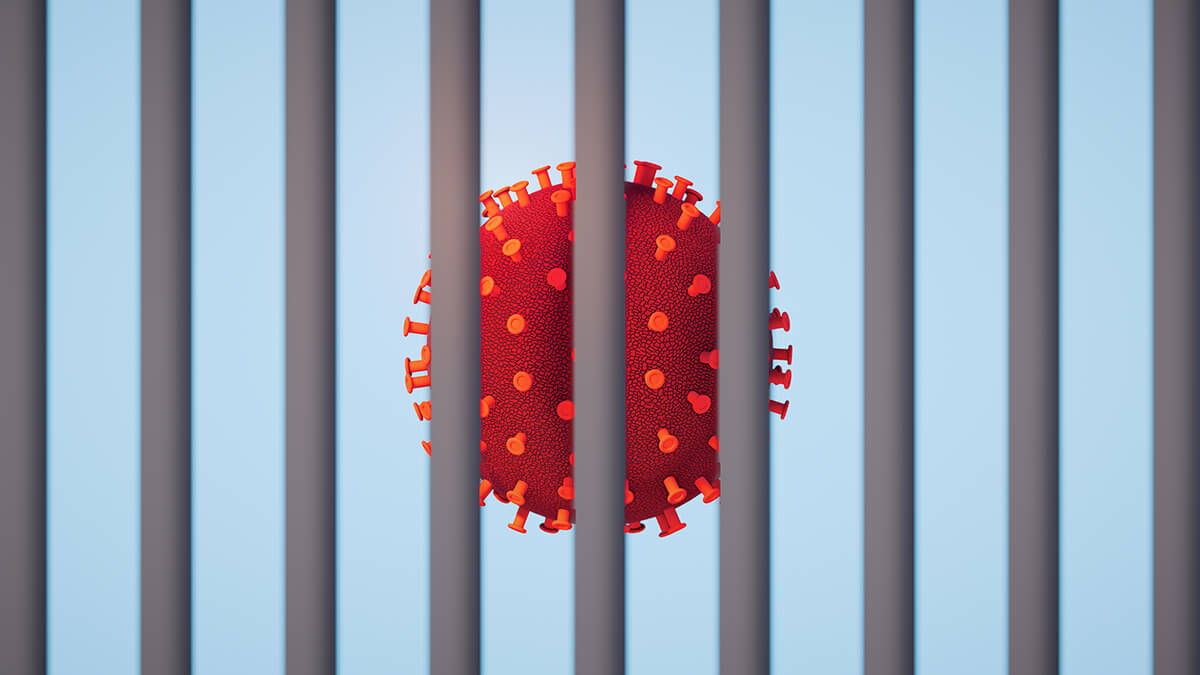There are more than 1,517,000 inmates serving time in state and federal prisons and jails in the U.S.1 In the midst of a global pandemic, more attention has been brought to existing health disparities and the various ways infectious diseases impact vulnerable populations—including those incarcerated across the U.S. So, how exactly has the COVID-19 outbreak affected the federal and state prison system? Below, we go over some key statistics that demonstrate its staggering impact.
By November 10, 2020, a total of 182,776 inmates had tested positive for coronavirus.2
According to The Marshall Project, a nonpartisan, nonprofit news organization tasked with tracking COVID-19 in federal and state prisons, cases initially hit an all-time high in late April of 2020 when states began mass testing. It is believed that many of inmates with coronavirus were asymptomatic, which lead to an increased rate of transmission. Of the 182,776 infected inmates, roughly 72% have recovered and less than 1% have died of COVID-19 related complications.
Texas and Florida have the highest number of reported coronavirus cases among prisoners.2
More than 25,500 cases have been reported by the state of Texas—that’s just over 2,109 cases per 10,000 inmates. Florida has reported nearly 16,969 cases, which is 2,006 cases per 10,000 inmates. Florida has also reported the highest number of total deaths due to the virus—184 inmates, which is approximately 22 inmates for every 10,000. Texas, Ohio, California, and Georgia follow Florida in the leading number of COVID-19 related deaths.
There have been at least 41,949 reported cases of coronavirus among prison staff.2
Inmates aren’t the only ones impacted by COVID-19 in state and federal prisons. Prison staff—including wardens, correctional officers, nurses, and other workers—are also at risk of becoming infected inside these facilities. 98 have died. Additionally, prison staff can also potentially carry coronavirus into their facility from the outside world, or from their facility to their community. Unfortunately, confirmed cases have only been reported by employees who voluntarily share their diagnosis—not due to any kind of mandatory testing—so staff cases are likely much higher.
Preventing the spread of coronavirus in state and federal prisons has proven difficult.3
Prisons are full of communal spaces, from showers and bathrooms to cells to dining halls. Because of the congregate nature of these facilities, it is nearly impossible for inmates and prison staff to socially distance. Prisons are also notorious for lacking basic sanitary supplies—such as soap, sanitizer, and industrial cleaners—and generally have a high rate of chronic disease. Moreover, personal protective equipment (PPE) is a vital resource to prevent the spread of COVID-19 but is sorely missing from the majority of prisons.
Strategies are being implemented to help lower COVID-19 cases and transmission.
To help combat the rise of coronavirus in the prison system, state agencies and local jurisdictions have been implementing preventative strategies. These measures include:3
- Reducing jail admissions, unnecessary contact, visits, and technical violations for individuals on probation or parole
- Releasing individuals from prison when reasonable and possible
- Terminating medical co-pays for correctional medical visits and testing
- Eliminating or reducing the costs of phone calls or video communications
Prepare to Impact the Criminal Justice System With a Master’s in Criminal Justice
Are you looking to earn your advanced criminal justice degree? In Walden’s online MS in Criminal Justice program, you can gain skills and knowledge that you can apply immediately on the job to influence positive, meaningful change in your organization and community. You can even focus your career on what interests you most by choosing from eight highly relevant and in-demand specializations, including Behavioral Sciences, Cybercrimes, and Law and Public Policy.
Earning your master’s in criminal justice at Walden, an accredited university, is a great choice if you want to advance your criminal justice career or transition from another field into the criminal justice field. And with online education, you can learn from wherever you have internet access—no need to commute to campus. Walden’s MS in Criminal Justice degree program gives you the power to take your classes at whatever time of day works best for you so that you can continue to work full time as you earn your master’s.
Walden University is an accredited institution offering an MS in Criminal Justice program online. Expand your career options and earn your degree using a convenient, flexible learning platform that fits your busy life.
1Source: www.prisonpolicy.org/reports/pie2020.html
2Source: www.themarshallproject.org/2020/05/01/a-state-by-state-look-at-coronavirus-in-prisons
3Source: www.ncsl.org/blog/2020/08/05/covid-19-in-us-prisons-and-jails.aspx
Walden University is accredited by The Higher Learning Commission, www.hlcommission.org.




